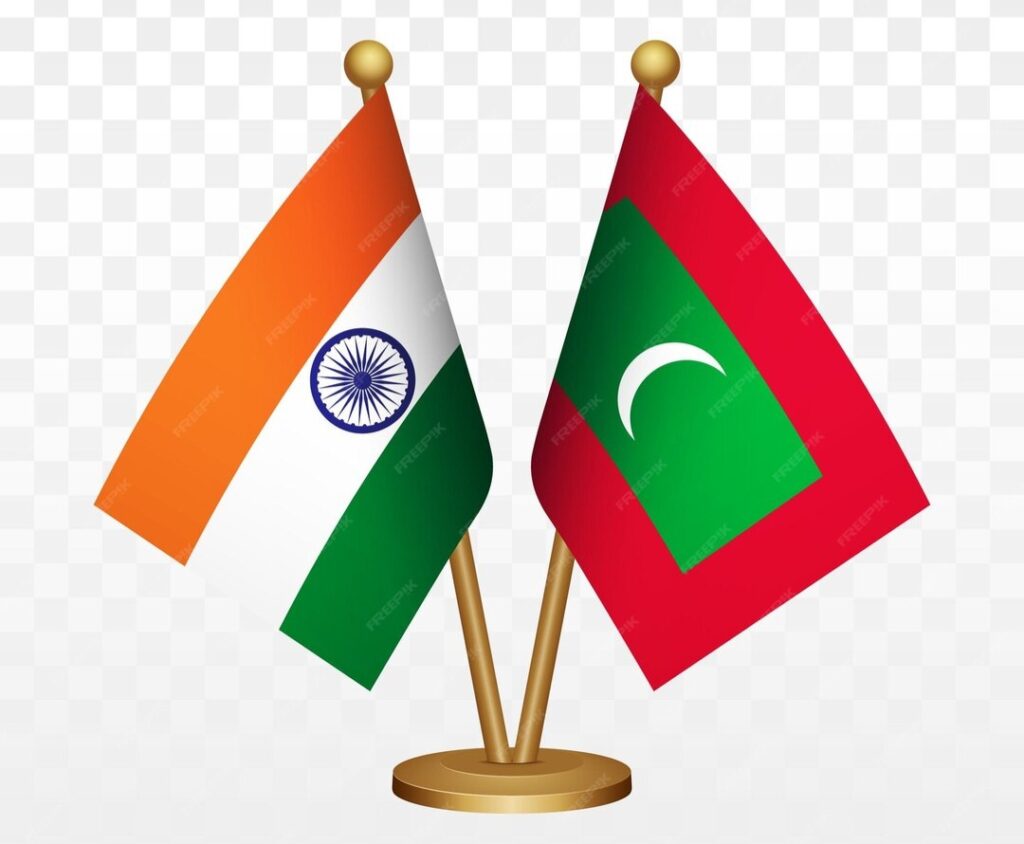By: Simran Sodhi, Guest Author, GSDN

Prime Minister Narendra Modi’s upcoming visit to the Maldives is a significant one and will help re-set the bilateral ties. India and the Maldives share an old connection but the last few years saw tensions spike in this relationship. Modi will visit the Maldives on July 25-26 after his visit to the United Kingdom.
On the invitation of the Maldivian President, Dr. Mohamed Muizzu, Modi’s state visit to the Maldives will begin on 25 July. Modi will be the “Guest of Honour” at the 60th anniversary celebrations of the independence of the Maldives which is on 26 July. Muizzu had paid a visit to India in October 2024 and that was seen as a first step towards the normalization of ties between the two nations. After his election victory in 2023, Muizzu had taken a stand that was generally seen as confrontational vis-à-vis India. He was also seen as being pro-China and that had increased tensions in the bilateral relationship.
Fast forward to 2025 and it seems geopolitics, and for India, the China factor, will provide the thrust needed to get this bilateral relationship back to a new normal. China has been working hard to increase its footprint in the South Asian region. From Nepal to Bhutan, China has been wooing smaller nation states with its economic prowess. The trilateral meet between China-Pakistan-Bangladesh held in June this year is a worrying development for India. The active Chinese support to Pakistan during Op Sindoor is another clear indication that China is actively pursuing its agenda to get its feet firmly into India’s neighbourhood.
During the visit of the Maldivian President in Oct 2024, India stepped in to help the Maldives which was in the midst of an economic crisis. India provided a currency swap for about US$ 750 million and rolled over US$ 50 million in credit. India was not too happy with Muizzu but also realised that India’s strategic interests in the region were best served by keeping the Maldives close. Modi’s visit on July 25-26 is India going further down that road and strategy.
It is also no secret that China is now working on forming a new regional grouping to replace SAARC (South Asian Association for Regional Cooperation). It is being actively supported in this endeavour by Pakistan and reports in Pakistan media suggest that the Maldives, along with Sri Lanka and Afghanistan will be part of the new grouping. SAARC today is a defunct grouping, courtesy the India-Pakistan bilateral issues. The last SAARC Summit was held in 2014 in Kathmandu, and in 2016 when the Summit was to be held in Pakistan, India declined to participate pointing to Pakistan’s role behind the Uri attacks. After Bangladesh, Bhutan and Afghanistan also declined to participate in the Islamabad meet, the Summit was called off. Even the BIMSTEC (Bay of Bengal Initiative for Multi-Sectoral Technical and Economic Cooperation) grouping has not proven to be as effective as India had hoped for.
In the backdrop of all these factors, Modi’s visit to the Maldives assumes greater significance. It also points to how both the leaders have realised that since geography ties them in a close embrace, the wise thing would be to co-operate as allies and partners.
During the 2024 State visit of the Maldivian president, a joint vision for a comprehensive economic and security partnership was adopted which has become the “guiding framework” for ties. India today is one of the largest trading partners of the Maldives, with two-way trade worth almost US$ 500 million. Both sides are also engaged in discussions for a free trade agreement (FTA) and an investment treaty, particularly focused on renewable energy and fisheries.
Muizzu, who had been elected in 2023 on a “India Out” campaign also seems to have realised that India remains a reliable partner. In Jan 2025, when the Maldivian Defence Minister Mohammed Ghassan Maumoon visited India, both countries agreed to strengthen their defence co-operation. India reaffirmed its readiness to support the Maldives to boost its defence preparedness, including through provisioning of defence platforms and assets to augment its capacities, in line with its national priorities, and New Delhi’s ‘Neighbourhood First’ policy and the vision of SAGAR (Security and Growth for All in the Region).
Modi’s visit to the Maldives then comes at a critical time for India. The Maldives and its leadership seem to have shrugged off the earlier anti-India sentiments and the relationship seems poised for a strengthening of ties. It also remains an important move by India to counter China’s attempts to spread its wings in the region.

About the Author
Simran Sodhi
Simran Sodhi is a Delhi-based journalist and foreign affairs analyst. She holds a Masters in International Relations from the American University in Washington DC. In 2009, her book ‘Piercing the Heart- Untold Stories of 26/11’ was published. She has written for a number of leading national and international publications. She tweets at @Simransodhi9

